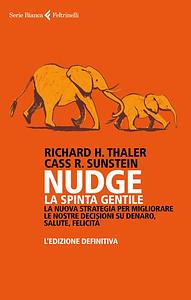Take a photo of a barcode or cover
Some interesting ideas, some things I may incorporate in my course design to help students. And now I'll be even more aware of as those websites trying to nudge me into "trip protection" and "extended warranties". No! I'm glad I read the most recent edition where they updated some things and responded to criticisms since the earlier editions. I like the idea of "Nudge for good" while fully acknowledging the potential for bad actors.
I had to read this book for school. Some things in this book were really interesting, but everything about saving money etc. was not relevant to my course. So i kind of skipped over some of it.
No matter your position in life or your career, this book is instrumental to framing your worldview. I thought it was fascinatingly brilliant and very insightful. Recommended to me by a mentor and definitely has shaped how I see and interact with the world since reading it.
informative
medium-paced
I read this book for my Decision Science class and it's fascinating to see how making small changes to systems can vastly increase or decrease people's participation. This book was published in 2008, so I would be really interested to read a follow up, based on the events of the last decade. It came out right as Obama was taking office and the economy was tanking. What examples would they highlight from the ten years since and what comments would they make on politics now that things seem more divided.
They talk a lot about libertarian paternalism and how while those two words seem contradictory, they simply mean liberty-preserving.
"A nudge, as we will use the term, is any aspect of the choice architecture that alters people's behavior in a predictable way without forbidding any options or significantly changing their economic incentives. To count as a mere nudge, the intervention must be easy and cheap to avoid."
When thinking about all of these factors in terms of marketing and decision science, there are great takeaways throughout the book about how people make decisions and how much they actually don't want to have to. More choice does not equal humans making better decisions for themselves.
They talk a lot about libertarian paternalism and how while those two words seem contradictory, they simply mean liberty-preserving.
"A nudge, as we will use the term, is any aspect of the choice architecture that alters people's behavior in a predictable way without forbidding any options or significantly changing their economic incentives. To count as a mere nudge, the intervention must be easy and cheap to avoid."
When thinking about all of these factors in terms of marketing and decision science, there are great takeaways throughout the book about how people make decisions and how much they actually don't want to have to. More choice does not equal humans making better decisions for themselves.
I gave this book twenty-four hours before I would sit down and write a review. I work in the realm of choice architecture - namely, information architecture. Every day, I run into situations where I have to make a decision that will help the user "decide" what they would like to do on a transactional web site. I think if I were far removed from this process, I wouldn't find this book interesting, but for the very reason of application, it necessitates reading by those working in usability and IA.
Still good. If you have read the 2008 book. I personally do not see a reason to get the “final edition “




